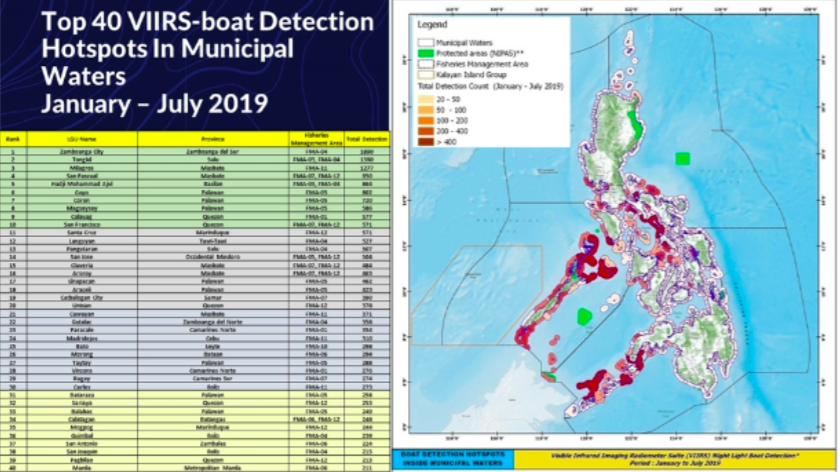
I have a friend working in a coastal community whose heart bleeds every time he sees the dire poverty of the residents. They are so poor they would not know where the next food will be coming from. This sad plight is so ironic, happening in our country which is known worldwide as the center of the center of marine shore fish biodiversity in the world.
Alarming is the fact that two thirds of our fishing grounds are over-exploited. Artisanal fishers attribute commercial fishing intrusion in municipal waters as the number one contributory factor. Use of the Visible Infrared Imaging Radiometer Suite (VIIRS) technology also confirms the prevalence of commercial fishing in municipal waters detected through night lights.

Source: Karagatan Patrol (a partnership of the League of Municipalities and Oceana)
My friend said trawls docked in front of the municipal hall are a common sight in his place. The use of bottom trawling is banned under RA 8550, the Fisheries Code of 1998, reiterated by the amendatory law, RA 10654.
On November 29, 2018, the Department of the Interior and Local Government (DILG) and the Department of Agriculture-Bureau of Fisheries and Aquatic Resources (BFAR) signed the Joint Memorandum Circular which provides the implementing guidelines on the ban on bottom trawling within municipal waters. It provides for decommissioning mechanisms and livelihood assistance. Alas, coastal local governments do not seem to know these guidelines exist.
Bottom trawling is devastating to our fisheries and the marine ecosystems, wipes out everything in the seabed and has contributed to the great loss of income of our artisanal fisherfolk, who are among the poorest of the poor. These fishers reminisce how it was when there was no trawling – fish, shrimps, crabs were in abundance in the past. They are worried that the time will come when there will be no more fish in the ocean if the ban on illegal fishing in municipal waters is not implemented.
To the credit of the Duterte administration, Secretary Eduardo Año of the Department of Interior and Local Government (DILG) issued DILG Memorandum Circular 2018-59 which enunciate the policies and guidelines on the regulation and monitoring of fishery activities in municipal waters. The policy purpose is “to ensure that LGUs play an active role, and hold them accountable to their action/inaction towards the monitoring and regulation of fishery activities in municipal waters”. It serves as a reminder to LGUs “to exercise their powers in ensuring that the law is strictly enforced, followed and implemented.”
To evaluate the performance of these local governments, DILG has adopted the Fisheries Law Compliance Audit, known as FISHCA, as a monitoring tool to evaluate the performance of LGUs in the implementation of our fisheries laws.
There are 857 coastal cities and municipalities who have the responsibility to protect our municipal waters. How many are implementing our laws and contribute towards the attainment of food security by fighting illegal fishing in municipal waters?
Disclaimer: The comments uploaded on this site do not necessarily represent or reflect the views of management and owner of Cebudailynews. We reserve the right to exclude comments that we deem to be inconsistent with our editorial standards.
